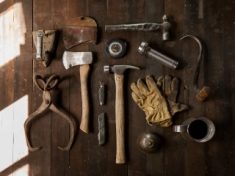
This post was written by Sarah McAfee, a former member of our team.
My son is really into tools right now. He marches around the house with this hammer and wrench “fixing” everything in his path. He thinks his dad’s voltage meter and measuring tape are great fun, and that he should be allowed to carry a pocket knife, too. (He’s two, so he thinks he’s old enough for everything.) I like watching him puzzle out how things work and figure out how to use a new tool to his advantage. Unconstrained by the knowledge of a tool’s intended use, he invents new uses for things, some of which are quite functional. Others involve boogers, but not every new idea can be a winner!
Watching him makes me think a lot about the tools in my life—the ones I take for granted, the ones I am under-utilizing, and the ones I should reimagine. As it relates to health, there are many tools that help us get and stay healthy, if we have access to them. My car, and the gas I can afford to put in it, let me get to doctor’s appointments, as well as to the grocery store that is farther away from my house than several fast food options. The hiking trails on the mesa and the well-maintained parks in my neighborhood are free recreation opportunities. Having health insurance means I can see a doctor when I’m sick or due for a physical.
Health equity is making sure everyone has the tools they need to live a healthy life, which is what we’re working toward every day at Center for Health Progress. We believe a high-functioning public transit system, access to driver’s licenses (regardless of documentation), and a well-funded and smartly-designed non-emergent medical transportation program are health equity tools for Colorado families. We work to ensure tools like Health First Colorado (Medicaid), SNAP, and WIC are available to stabilize lives and improve health. And, we’re trying to reimagine how these tools could be used in new and better ways, too.
For example, Medicaid has historically been a tool for providing access to health care services, but what is “health care?” Could affordable housing or healthy food be a form of health care? We think so, and Colorado is working toward that reality. Several years ago, Colorado began an experiment in Medicaid called the Accountable Care Collaborative, which connected Medicaid enrollees to medical homes, increased data collection, and organized the state into regions with one organization coordinating care for the entire region. Based on the data, it made Medicaid coverage a slightly more effective tool for enrollees seeking better health. Now we’re entering phase two, where the state will better integrate physical and behavioral health care, add new data sources, begin to pay providers and practices more for providing care that is high quality (based on pre-determined metrics), and dip our collective toes in the water of addressing the social determinants of health. These regional organizations will have some flexibility to fund programs and community organizations that create economic opportunity, make housing more affordable, and increase educational attainment.
We’re particularly excited about this last change, which we see as key to optimizing Medicaid as a tool for health equity. We’ll be working to move Colorado from a timid toe-dip to an enthusiastic cannonball into the deep end of funding food, housing, transportation, and other basic necessities as health needs—because addressing the barriers to those necessities will do more for a person’s health than clinical interventions can. I hope you’ll think about the tools you have at your disposal, and join us in some creative re-envisioning to drive health equity!




